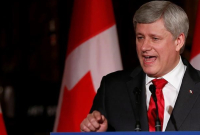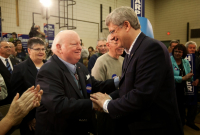Support strong Canadian climate journalism for 2025
Canadians love discipline unto self-flagellation – "peace, order, and good government." Liberty is just a word, not a real concept. Be still you bleeding heart liberals, and if you don't like our version of what's good for you, why that's un-Canadian, and who needs you?
In 1914, when the crowned heads of Europe started an utterly insane war, we were ordered to be "at Britain's side, whate'er betide," even though we had no national interests at stake in the conflict. We meekly obeyed.
In 1970, when Pierre Trudeau put the entire country under martial law over a perceived revolution in Quebec, Canadians were cowed — and loved it.
When the current bunch brought in an unconscionable, draconian anti-terrorism bill aided by Trudeau's little boy, we knuckled under.
But many Canadians are made of sterner stuff and want their MPs to oppose legislated tyranny. So why don't they?
Because the Canadian parliament is gutless and MPs quaver before their masters and their whips.
The British magazine, Prospect, in its recent issue, tells of Conservative MP Philip Hollobone, who voted against his government 237 times. One such dissent, in 2013, helped inflict a humiliating defeat on Prime Minister Cameron when he asked for military action against Syria.
The entire basis of the voting structure of our parliament is that a lost vote requires the government to resign. That this is utter rot seems irrelevant to those elected to govern us. In fact, the government need only resign on losing a "confidence vote" yet the myth remains that we require "party discipline" for governments to survive.
It's instructive to look at the UK parliament experience. As here, important votes like the second readings of significant Bills carry what's called a 'three-line whip", the defiance of which is very serious, sometimes resulting in the "whip" being withdrawn, with the disobedient MP expelled from the party until the "whip" is restored, if that happens.
Despite this, governments lose a lot of "whipped" votes.
In the first Harold Wilson government (1965-70) it happened six times as it did in the Edward Heath government (1970-74) that followed. The second Harold Wilson government, (1974-6) suffered 25 defeats and his successor, Jim Callaghan (1976-9), 34.
Under the "Iron Lady," Margaret Thatcher, things improved for the government yet in 11 years she was still defeated four times while John Major (1990-97) was defeated six times in seven years.
Tony Blair (1997-07) lost four times and Gordon Brown (2007-11) three times while in the last 4 years, David Cameron was beaten six times.
Remember, in all of those defeats, a "three-line whip" was in effect and members were ordered to vote for the government, "or else".
How many times has the Harper government lost a whipped vote? Zero! Indeed, I can find no record of a single Tory voting against orders (Lest one think that the NDP has more freedom, not one's voted against orders since Thomas Mulcair took over, either).
We've seen in the UK that governments survive dissent just fine. Mr. Cameron survived Mr. Hollobone who just resoundingly defeated three competitors in a swing riding with over 50 per cent..
There are, of course, penalties. One doubts that Mr. Hollobone is very high on the list for promotion in the forthcoming Cameron government. But many don't run to gain office but to represent their constituencies and their own beliefs and know that when MPs can vote against a bill without fatal consequences, they're far more likely to speak up for those who elected them. Constituents thus feel much better represented no matter how the MP finally votes.
What can be done to give our MPs the ability to vote their conscience and in constituents' interests as they see them?
Of course the prime minister can simply declare that an MP will not be expelled from caucus for voting against the government or, only expelled under extraordinary circumstances but that's highly unlikely under a congenital autocrat like Mr. Harper and there's no evidence that Mr. Mulcair would an improvement.
MPs could table their own motion, but this not only requires a great deal of courage and cross party cooperation, but potentially faces fatal procedural difficulties.
There is a simple answer, yet for some reason Canadians recoil at the suggestion.
None of us, for one moment, would go back to the system of open voting. We insist, and rightly so, on a secret ballot. Why, then, should not an MP have a secret ballot on whipped votes? Why shouldn't they be as free from outside pressure as those who elect them?
Of course, the government might lose some votes as happens in Great Britain, yet it has survived — even World War II, when Churchill overcame two confidence votes.
Moreover, if because it loses the means of compulsion, the government must bring MPs into their confidence, discuss proposed legislation and gain some consensus, they likely won't lose votes and may even abandon some bad ideas.
Surely even disciplined Canadians could learn to live with that.





Comments